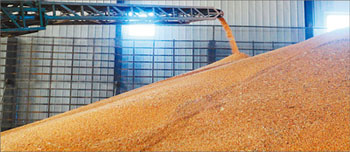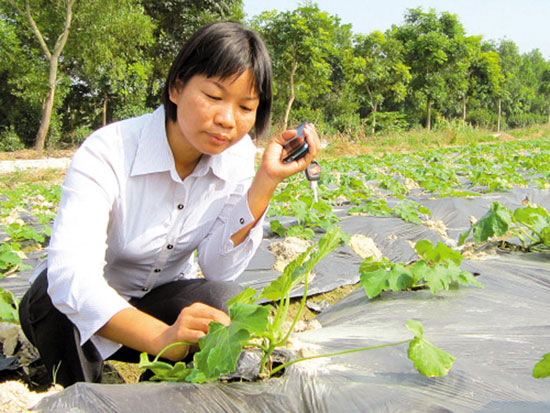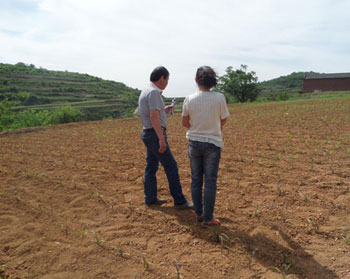Increase in grain production, reduce costs, wait for time.
Original title: twelve consecutive increases in grain: happiness is even more worrying.

A drying factory in Heihe City, Heilongjiang Province dries the newly harvested corn to ensure that the new grain is dry and stored in storage. Photo by Wei Jianshun (people's Vision)
According to data released by the National Bureau of Statistics on December 8, the country's total grain output in 2015 was 621.435 million tons, an increase of 14.408 million tons or 2.4 percent over 2014. China's grain output has achieved "twelve consecutive increases".
"it is necessary to increase production, and as a big country, it is still necessary to maintain self-sufficiency in rations." Dang Guoying, director of the Hongguan Office of the Institute of Rural Development of the Chinese Academy of Social Sciences, said.
Don't panic if you have grain in your hand. in the eyes of many people, an increase in grain production is a good thing.
However, Ren Jizhou, academician of the Chinese Academy of Engineering, believes that this is a "tragedy"-"if grain storage exceeds the safety factor, it is a burden, and 'grain is expensive and hurts farmers'."
Similarly, in the view of Zhu Qizhen, director of the Institute of Peasant Studies at China Agricultural University, this is "not a good phenomenon. The pursuit of sustained production and damage to farmers' income is unsustainable agriculture."
Behind the high yield, what is the problem with China's grain production, which leads to such a negative view?
There are reasons for high yield.
This year, the central government continued to strengthen its support to farmers and allocated various subsidy funds such as grain direct subsidies and improved seed subsidies in 2015 in a timely manner, thus stabilizing farmers' expectations of grain income. God's help, coupled with the support of policy, science and technology, has created conditions for increasing grain production this year.
Hou Rui, a senior statistician in the Rural Department of the National Bureau of Statistics, said that the expansion of grain sown area has also created basic conditions for a bumper grain harvest. Data show that the cotton sown area in some parts of Jianghuai has decreased by nearly 30%. Due to the expansion of the sown area, the country has increased grain production by about 6.7 billion jin, contributing 23.1% to the increase in grain production.
Zhu Qizhen told our reporter that the increase in grain production is also due to the dominant position of imported soybeans, and the planting area of domestic soybeans is decreasing, replaced by the cultivation of corn and rice.
In addition, there is a very important factor in the large-scale operation in recent years, some bosses contracted the land, predatory use of land, the pursuit of high input, high output, so that land output increased in a short period of time.
If it can't be sold, it can't be sustained.
At present, a current situation that can not be ignored is: import rations into the market, domestic grain into the warehouse.
"our cost price has no advantage compared with the CIF price of imported grain, it is difficult for farmers to sell grain, the state has a heavy burden on grain storage, and chemical fertilizers and pesticides cause soil and water pollution and food pollution." In an interview with our reporter, Ren Jizhou stressed: "this burden cannot be borne, and it is time for agriculture to have to reform."
Chen Zhangliang, vice chairman of the China Association for Science and Technology, is also worried about this. This year, he went to three provinces and eight cities to conduct a survey and found that the warehouse was full and the grain could not be sold, and what could be sold was imported grain. The three staple grains imported from abroad are cheaper than domestic grains. The same is true of staple agricultural products such as sugar.
"Ten years ago we were cheaper than others, but all of a sudden they were all more expensive than internationally. On the one hand, there is an increase in grain production, on the other hand, we can only import. Why has China's agricultural competitiveness suddenly declined? What happened to Chinese agriculture? " Chen Zhangliang asked.
In fact, in terms of food rations, people do not need so much grain. According to Ren Jizhou, most of the grain consumed by our country every year is used as feed, and feeding grass to livestock is more nutritious and comprehensive than eating grain, and it is not economical to feed food to livestock. The diet structure of Chinese people is also changing, that is, they need more meat, eggs and milk, and the output of meat, eggs and milk needs grass feed to support it.
This year, the Ministry of Agriculture issued a document calling for sustainable development and appropriately conducting fallow pilot projects.
In Zhu Qizhen's view, on the one hand, the abandonment of land, on the other hand, the pursuit of high input and high output on limited land, is to squeeze land, is an unsustainable way of agriculture. The development path with high input of resources such as soil, water, fertilizer and power will lead to the loss of both ecology and production. In addition, a large area of land is abandoned, which is also unsustainable.
Abandoning wasteland and fallow are two different things. Zhu Qizhen explains that fallow is land for rest and recuperation, and it is a process of increasing fertility. If weeds and trees are abandoned and water conservancy facilities are destroyed, soil fertility will decline.
"the output should be moderate, not the pursuit of as high a yield as possible. In the past, there were also problems with the concept of development. " Zhu Qizhen said.
The direction of the structure should be adjusted.
In Dang Guoying's view, while increasing output, reducing the cost of agricultural production is a challenge, and the achievements in this regard are not enough.
The reform of agricultural structure is extremely urgent. in order to change the current embarrassing situation of agricultural development, Ren Jizhou pointed out that we should rely on grassland agriculture and a variety of forage crops.
Experts believe that the adequate arrangement of food rations and the rotation of grass fields on other land can meet the feed gap and greatly reduce the demand for food. At the same time, water conservancy should be restored. This is not only an understanding, but also a culture. Grassland agricultural system is a modern agricultural system that can meet the food structure of modern people, take into account ecology and production, and achieve sustainable development.
The first document of this year also proposed that crop rotation should be used to grow forage. In addition, the state has set up some demonstration areas for grassland agriculture, but Ren Jizhou believes that the strength is not enough and the project is not systematic enough. "the train of thought for the reform of grassland agricultural structure is not clear."
In Zhu Qizhen's view, the land should be given a chance to recuperate in the future, instead of pursuing the so-called high output at present. The land should not only be fully utilized, but also be reasonably produced. The agricultural management mode of killing the goose that lays the golden eggs should not be adopted, and the principle of sustainable development should be put in the first place of agricultural production.
In the future, agricultural mechanization is an effective means to solve the labor shortage. Zhu Qizhen proposed that not only large-scale agricultural machinery should be developed, but also small agricultural machinery suitable for mountainous and hilly land should be developed. The vast mountainous, semi-mountainous and hilly areas are important production areas of characteristic agricultural products, and improving the level of mechanization and land use in these areas is an important aspect of China's agricultural security.
"breeding should be more local, and there should not be one variety all over the country. We should encourage differences and highlight localization, diversification, and characteristics, which are conducive to the formation of national brands and diversified agriculture, and reduce vicious competition in homogeneous agriculture." Zhu Qizhen said.
"through the popularization of soil testing formula technology, it is also very important to reduce the amount of chemical fertilizers and pesticides." Zhu Qizhen believes that it is necessary to protect cultivated land in the form of scientific agricultural organization, realize the sustainable development of agriculture, and avoid predatory land use through institutional guarantee, so as to achieve the goal of sufficient quantity, safe quality, and reasonable price of China's agriculture. (our reporter Wang Hui)
- Prev

Girls who return to their hometown to work in Jiangmen have earned hundreds of millions of yuan this year.
Girls who return to their hometown to work in Jiangmen have earned hundreds of millions of yuan this year.
- Next

How to interpret the industrialization of agricultural development is controversial.
How to interpret the industrialization of agricultural development is controversial.
Related
- A course of planting techniques and methods on how to grow carrots
- How to plant the latest tulips?
- Is it better to pick tea in the morning or in the afternoon? When is the best time for tea to be picked? what is the third or fifth tea?
- Launch Yuanxiao Happy combination Haocha + Tea Yuan healthy Taste
- Penghu Tourism "Fireworks 20 Parade with You"
- 2022 West Lake Happiness holds "Digital Revitalization Voucher" and draws iphone13 and laptop.
- Banqiao Fuzhou social houses are designed to change start-up combined with police elimination to create a safe and livable environment
- The convenient measure of "mechanical weeding" in Xinbei has been abused and the Agriculture Bureau has imposed heavy penalties on the illegal land consolidation.
- Changgeng University Joins Hands with Four Memory Factories to Rescue Memory Talent Shortage
- The list of Taiwan's top 100 MVP managers is listed by the Director-General of the Farmers' Association of Sanxia District.

